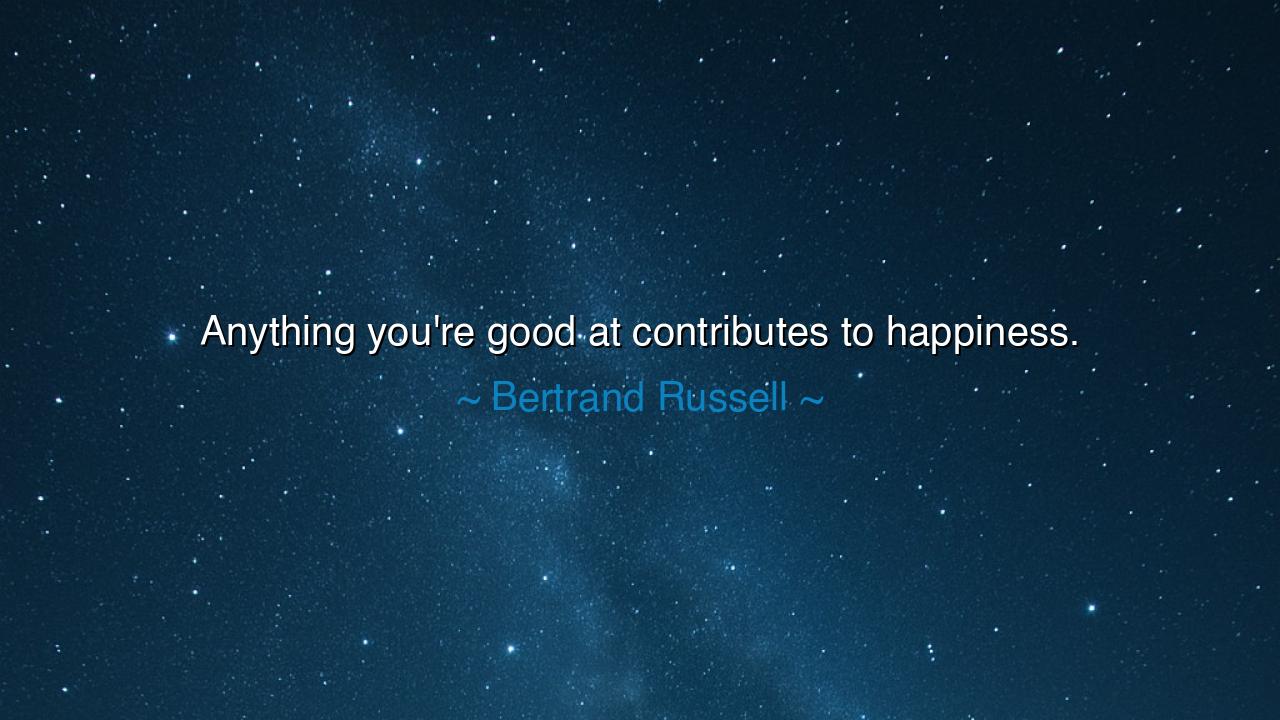
Anything you're good at contributes to happiness.






The words of Bertrand Russell — “Anything you’re good at contributes to happiness.” — are as simple as they are profound. They remind us that happiness is not a prize to be hunted in distant fields, but a byproduct of harmony between one’s talent, one’s effort, and one’s purpose. Russell, one of the greatest philosophers and humanists of the modern age, did not speak these words lightly. He lived through wars, revolutions, and intellectual upheavals, yet he understood that the root of joy lies not in circumstance but in engagement — in the act of doing something well, however humble, and losing oneself in the rhythm of creation. His teaching is timeless: that mastery, even in small things, kindles the inner flame of fulfillment.
Russell’s life was a tapestry of curiosity and courage. A logician, mathematician, and moral philosopher, he sought truth in all things — from the vastness of the cosmos to the subtle motions of the human heart. To him, happiness was not mere pleasure, but a deep satisfaction born from the exercise of one’s best powers. He saw that the mind, like a garden, must be cultivated; idleness breeds discontent, while skill and achievement, however modest, nourish the soul. Whether in the playing of a melody, the crafting of an argument, or the tending of a garden, man finds joy when he acts in accordance with his gifts. For in using our abilities, we affirm our place in the great order of life.
The ancients, too, knew this truth. Aristotle, writing centuries before Russell, called it eudaimonia — the flourishing of the soul through the right use of reason and virtue. To live well, he said, is to fulfill the function that one’s nature was meant for. The sculptor finds peace in shaping marble, the sailor in mastering the winds, the teacher in guiding minds toward light. Each act of excellence, however ordinary it may seem, connects man to his higher self. Russell’s wisdom is but the modern echo of this ancient song: that to be good at something is not only to gain success, but to taste a form of happiness that no wealth can replace.
Consider the life of Ludwig van Beethoven, the composer who, even as deafness closed the world of sound around him, continued to create music that touched eternity. His suffering was immense; he was isolated, misunderstood, and often tormented by despair. Yet, through his craft, he found transcendence. His genius was his refuge, his offering, his joy. When he composed his Ninth Symphony, he could not hear the notes, yet he felt them with the totality of his being. That act — doing what he was good at, even when the world seemed to conspire against him — brought him a kind of happiness beyond circumstance. In this, he embodied Russell’s truth: that to work from the depths of one’s gift is to find meaning, even amid pain.
Russell’s insight also carries a lesson for all who doubt their worth. He reminds us that no skill is too small, no talent too trivial, if it brings happiness through expression. The craftsman who shapes wood with care, the child who paints in wonder, the parent who nurtures with patience — all partake in the same sacred act. What matters is not the grandeur of the deed, but the excellence of the spirit within it. For in doing what we are good at, we lose the restless hunger for validation and instead find peace in participation. Each act of mastery, however humble, is a thread in the fabric of joy.
But Russell also hints at another truth: that happiness is not merely given, it is cultivated through practice. To become good at something requires discipline, perseverance, and love. Skill is not the gift of fate, but the reward of devotion. The musician’s melody, the philosopher’s insight, the athlete’s grace — all are born of years of unseen labor. Yet in that labor lies the secret joy Russell speaks of: the steady satisfaction of growth. To strive toward mastery is to move toward happiness, for every small victory strengthens the bond between self and purpose.
Thus, let this wisdom be remembered: seek not happiness as a separate goal, but as the natural companion of your best efforts. Find what you love, or love what you do, and dedicate yourself to it. Whether your craft is in art, teaching, farming, or the quiet service of others, pour yourself into it with sincerity. Let your skills become the instrument through which your soul sings. For in the end, as Russell teaches, anything you are good at contributes to happiness — because in doing it, you are living in harmony with your truest self.
So, my friend, remember this: happiness is not a gift waiting to be received, but a light that kindles in the act of doing. To create, to learn, to master — these are the sacred labors through which joy is born. Cultivate your gifts, refine your talents, and share them freely with the world. For in every act of excellence, you will not only enrich life itself, but find, within your own heart, the quiet and enduring happiness that Bertrand Russell so wisely spoke of — the happiness that arises whenever a human being becomes what they were meant to be.






AAdministratorAdministrator
Welcome, honored guests. Please leave a comment, we will respond soon